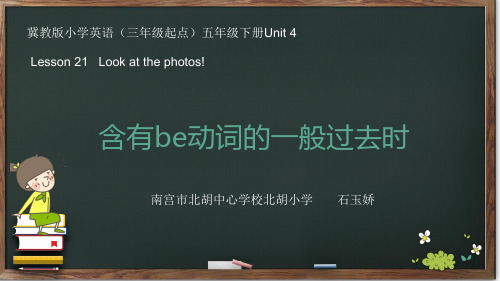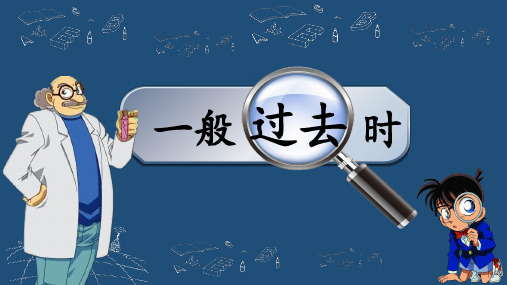小学英语一般过去时讲解课件
合集下载
小学英语六年级一般过去式复习课件PPT

We went to the cinema.
1.Where did you go three days ago ?(去佛山) 2. Where did she go three days ago ? 3. Where did he go ? (去书店) 4. Where did they go? 5. Where did Sally go? (去学校) 6. Where did Mr. Liu go?
5) ---Where __B _ you ___ on your holiday? A. did do B. did go C. do go D. do did
Please answer the questions. (回答问题) 1)Where did you go last holiday? __I w_e_nt _to_th_e _lib_rar_y.______ 2)How did Funny go to the park? _F_u_nn_y _we_nt_to_th_e_pa_rk_o_n _foo_t._
其他: 1. Was …?
Yes,…was. / No, …wasn’t. 如: Was it sunny yesterday? 1) Was the weather rainy yesterday? 2) Was Miss Tang excited last week? 3) Was Huang Junjie bored?
其他: 1.Did ……+动词(原形)?
Yes,…did. / No, …didn’t. 如: Did you play football yesterday? 1) Did you________ the room? 2) Did she ______ swimming yesterday? 3) Did your leg hurt last Monday?
1.Where did you go three days ago ?(去佛山) 2. Where did she go three days ago ? 3. Where did he go ? (去书店) 4. Where did they go? 5. Where did Sally go? (去学校) 6. Where did Mr. Liu go?
5) ---Where __B _ you ___ on your holiday? A. did do B. did go C. do go D. do did
Please answer the questions. (回答问题) 1)Where did you go last holiday? __I w_e_nt _to_th_e _lib_rar_y.______ 2)How did Funny go to the park? _F_u_nn_y _we_nt_to_th_e_pa_rk_o_n _foo_t._
其他: 1. Was …?
Yes,…was. / No, …wasn’t. 如: Was it sunny yesterday? 1) Was the weather rainy yesterday? 2) Was Miss Tang excited last week? 3) Was Huang Junjie bored?
其他: 1.Did ……+动词(原形)?
Yes,…did. / No, …didn’t. 如: Did you play football yesterday? 1) Did you________ the room? 2) Did she ______ swimming yesterday? 3) Did your leg hurt last Monday?
小升初英语 第五部分 时态 第二十二天 一般过去时课件小学六年级英语课件

was
evening? had —I ________ (be) in the office.
2.We ________ (have) a good time last night.
12/6/2021
第九页,共十三页。
12/6/2021
第十页,共十三页。
B
12/6/2021
第十一页,共十三页。
12Hale Waihona Puke 6/2021第四页,共十三页。
12/6/2021
第五页,共十三页。
12/6/2021
第六页,共十三页。
(三)一般过去时的基本用法 1.有确定的过去时间状语时要用一般过去时。如: I visited my uncle yesterday.昨天我拜访(bàifǎng)了我
叔叔。
2.表示过去一段时间内的经常性、习惯性或反复 性的动作或存在的状态。如:
She often played computer games in 2013.2013 年她经常玩电脑游戏。
12/6/2021
Miss Wang was a teacher.王小姐过去是位老师。 第七页,共十三页。
12/6/2021
第八页,共十三页。
用括号内所给单词(dāncí)的适当形式填空。 1.—werWe here ________ (be) you yesterday
12/6/2021
第一页,共十三页。
12/6/2021
第二页,共十三页。
一般过去时表示在过去的时间里发生的动作或存 在的状态。
(一)一般过去时的谓语(wèiyǔ)动词形式 一般过去时的谓语(wèiyǔ)动词由be动词或实义动词
构成,其形式如下:
12/6/2021
evening? had —I ________ (be) in the office.
2.We ________ (have) a good time last night.
12/6/2021
第九页,共十三页。
12/6/2021
第十页,共十三页。
B
12/6/2021
第十一页,共十三页。
12Hale Waihona Puke 6/2021第四页,共十三页。
12/6/2021
第五页,共十三页。
12/6/2021
第六页,共十三页。
(三)一般过去时的基本用法 1.有确定的过去时间状语时要用一般过去时。如: I visited my uncle yesterday.昨天我拜访(bàifǎng)了我
叔叔。
2.表示过去一段时间内的经常性、习惯性或反复 性的动作或存在的状态。如:
She often played computer games in 2013.2013 年她经常玩电脑游戏。
12/6/2021
Miss Wang was a teacher.王小姐过去是位老师。 第七页,共十三页。
12/6/2021
第八页,共十三页。
用括号内所给单词(dāncí)的适当形式填空。 1.—werWe here ________ (be) you yesterday
12/6/2021
第一页,共十三页。
12/6/2021
第二页,共十三页。
一般过去时表示在过去的时间里发生的动作或存 在的状态。
(一)一般过去时的谓语(wèiyǔ)动词形式 一般过去时的谓语(wèiyǔ)动词由be动词或实义动词
构成,其形式如下:
12/6/2021
含有be动词的一般过去时课件

冀教版小学英语(三年级起点)五年级下册Unit 4 Lesson 21 Look at the photos!
含有be动词的一般过去时
南宫市北胡中心学校北胡小学 石玉娇
01 一般过去时(含有be动词)的含义
表示人或物在过去某个时间的情况或存在的状态。
在句中,常和表示过去的时间状语连用,如: yesterday ,last week, last year ,in 2008,three days ago 等。
02
Be动词的一般过去式
be动词的过去式形式为was/were,具体来说:
原形 am is are 过去式 was was were
①He is eight years old this year. He was seven years old last year.
②I am happy today. I was sad yesterday.
①
I _w_a_s__ a baby in 2010.
I _a_m__ a boy now.
②
They _w_e_r_e_ eggs last
week.
They _a_r_e_ baby chickens now.
③ The elephant _w_a_s_ small five years ago.
②I was sad yesterday. Were you sad yesterday?
③We were in China last week. Were you in China last week?
Note:注意主语与be动词的对应变化。
04 Exercise : 1.Read and write “am”,“is”,“are”,“was” or “were”.
含有be动词的一般过去时
南宫市北胡中心学校北胡小学 石玉娇
01 一般过去时(含有be动词)的含义
表示人或物在过去某个时间的情况或存在的状态。
在句中,常和表示过去的时间状语连用,如: yesterday ,last week, last year ,in 2008,three days ago 等。
02
Be动词的一般过去式
be动词的过去式形式为was/were,具体来说:
原形 am is are 过去式 was was were
①He is eight years old this year. He was seven years old last year.
②I am happy today. I was sad yesterday.
①
I _w_a_s__ a baby in 2010.
I _a_m__ a boy now.
②
They _w_e_r_e_ eggs last
week.
They _a_r_e_ baby chickens now.
③ The elephant _w_a_s_ small five years ago.
②I was sad yesterday. Were you sad yesterday?
③We were in China last week. Were you in China last week?
Note:注意主语与be动词的对应变化。
04 Exercise : 1.Read and write “am”,“is”,“are”,“was” or “were”.
小学英语语法一般过去时精品课件

CoMInIcaMyCponyodloabnakdyoaueaeungdudghgfshtlfheoottwormsetworebkmlaifotsoleeslost1ycd7ehalasjekyustreesetskatrwedransyaenoyeodw..kl.dj.u.ice two days ago.
put-put
think-thought buy-bought bring-brought teach-taught
Task3 快速说出以下不规则动词的过去式
mhklgbbpfeofefaaiaulasvntevykleytdeple
Task4 用所给词的适当形式填空
1. We ___p_la_y_e_d__ (play) on the playground last Sunday. 2. He ___g_o_t____( get) up at six yesterday morning. 3. My father____lo_s_t___ (lose) the key two days ago. 4. Mike often ___st_u_d_i_ed__(study) Chinese after school last year. 5.Danny ____p_u_t____(put) on the coat just now. 6. They ___m__o_v_e_d__(move) to the USA in 1865.
2.主语+实义动词过去式+其它
eg. She worked at home yesterday. I went to the park last night. They usually went to the park three months ago.
小学英语一般过去时讲解

过去一段时间内反 复发生的动作
表示过去连续发生 的动作
• 用于讲述过去的事件,存在于故事,小说中。
解读
be动词的一般 过去时
be动词的一般过去式 主语 时态
I he, she, it you we, they
一般现在时 am is are are
一般过去时 was wasADD CAPTION TEXT
1
2
3
He was in the US last year. 他去年在美国 I was very tired last night. 我昨天晚上非常疲惫 I was very tired last night. 我昨天晚上非常疲惫
We said goodbye to him at five. 我们今天五点和他告别
4
基本用法
CLICK TO ADD CAPTION TEXT
过去某一时间内发 • 带有明确的时间状语 生的动作或情况 • 指过去发生的动作或存在的状态
• 持续了一段时间的行为或过去曾经存在过的状态 • 常与always, never 连用。强调已经终止的习惯要 用used to
概述
•动词的一般过去时
动词的一般过去时主要表示过去的动 作或状态
表现形式
主语+过去式
例句
CLICK TO ADD CAPTION TEXT
He walks to school.
一般现在
He walked to school
一般过去
例句1中的动词walks是现在时,表 示目前的习惯性,经常性的动作; 例句2中的动词walked是过去式, 叙述过去发生过的事情
She was a teacher. 她曾经是个老师。
小学升初中英语时态专题:一般过去时 全国通用版(共12张PPT)精品学习课件

Many young people have more opportunities to study abroad. Each coin has two sides. Studying abroad also has many disadvantages. For one thing, it will cost
要借助助动词 did 完成
1) 一般情况下,在动词原形后直接加 -ed。如:wanted, played。 2) 以不发音的字母 e 结尾的动词,直接加 -d。如:hoped, lived。 3) 重读闭音节单词需双写最后一个辅音字母,再加 -ed。如: stopped, shipped。 4) 以辅音字母 +y 结尾的动词变 y 为 i,再加 -ed。如:studied, worried。
(二)用词的适当形式填空。
1 They____(be) on the farm a moment ago. 2 There____(be)a shop not long ago. 3 Jenny____(not go)to bed until 11:00 o'clock last night. 4 Danny _____(read )English five minutes ago. 5 I _____(see)Li Lei ____(go) out just now. 6 He ____(do)his homework every day. But he __(not do)it yesterday. 7 When I was young, I _____(play)games with my friends. 8 When ____you_____(write)this book? I _____it last year. 9 Did he____(have) lunch at home? 10 I _____(eat) the bread, I 'm full now.
要借助助动词 did 完成
1) 一般情况下,在动词原形后直接加 -ed。如:wanted, played。 2) 以不发音的字母 e 结尾的动词,直接加 -d。如:hoped, lived。 3) 重读闭音节单词需双写最后一个辅音字母,再加 -ed。如: stopped, shipped。 4) 以辅音字母 +y 结尾的动词变 y 为 i,再加 -ed。如:studied, worried。
(二)用词的适当形式填空。
1 They____(be) on the farm a moment ago. 2 There____(be)a shop not long ago. 3 Jenny____(not go)to bed until 11:00 o'clock last night. 4 Danny _____(read )English five minutes ago. 5 I _____(see)Li Lei ____(go) out just now. 6 He ____(do)his homework every day. But he __(not do)it yesterday. 7 When I was young, I _____(play)games with my friends. 8 When ____you_____(write)this book? I _____it last year. 9 Did he____(have) lunch at home? 10 I _____(eat) the bread, I 'm full now.
小学英语精美课件-时态讲解-通用版(共22张PPT)

标志词:
next year/month/week/Sunday, tomorrow
Part 3 在此添加标题
1.我明天将要去公园。(翻译)
I will go to the park tomorrow.
2, My brother will go
week.
(go) to Shanghai next
3. I’ll join them.(改否定)
现在进行时
定义:表示此时此刻正在进行或发生的动作 标志词:now look listen
结构:
肯定句:主+be+V-ing+其他 否定句:be后加not 一般疑问句: Be动词提前
She is running.
She isn’t running.
Is she running?
Exercise:
否定句:be后加not,缩写 为wasn’t/weren’t
I wasn’t happy.
一般疑问句:was/were提前 Were you happy?
动作类(V.)
动词变过去 式规则
肯定句: 主+V过去式+其他
1.一般词尾直接加ed. 2.已不发音的e结尾,直接加d. 3.以“辅+y”结尾,变y为i加ed. 4.重读闭音节 ,且末尾只有一个 辅音字母,双写这个辅音字母, 再加ed。
表动作(V.)
若主语为第三人称,动 词变单三,动词加s/es
肯定句:主语+V.+其他
I play football every day.
He often reads books.
一般疑问句:助动词提前 Do you play football every day? Does he often read books?
小学英语过去式完整ppt课件

• 动词要用过去式,时间状语句末站。
• 否定句很简单,didn't 站在动词原形前,其 它部分不要变。
• 一般疑问句也好变,did放在句子前,主语、 动原、其它部分依次站。
• 特殊疑问句也简单,疑问词加一般疑问句记 心间。动词若是be,就用 was或were, 否定 就把 not添,一般疑问很简单,was, were直 接提前。
规则变化不规则变化grouponegrouptwodanceplayedlivedworkedlikedlookedwatchedvisitedhopeddancedused一般在动词原形末尾加一般在动词原形末尾加eded结尾是e的动词加groupthreegroupfourtry2planworry3stopstudyshoppedcriedworriedcarriedstoppedstudiedtried末尾只有一个辅音字母的重读闭音节词双写这个辅音字母后加ed末尾是辅音字母y的动词groupfivegroupsixdidwentsawhadbroughttookwerespokeboughtiphoneyouhaveiphoneyouhaveiphonehehasiphonehehasiphone
3He oftend_o_e_shis homework at his friend’s home. 4.He __d_i_d_ his homework at school yesterday.
.
He plays basketball every day.
He played basketball yesterday.
play played go
do/does did
went
.
一般过去时态的定义及基本用法
• 否定句很简单,didn't 站在动词原形前,其 它部分不要变。
• 一般疑问句也好变,did放在句子前,主语、 动原、其它部分依次站。
• 特殊疑问句也简单,疑问词加一般疑问句记 心间。动词若是be,就用 was或were, 否定 就把 not添,一般疑问很简单,was, were直 接提前。
规则变化不规则变化grouponegrouptwodanceplayedlivedworkedlikedlookedwatchedvisitedhopeddancedused一般在动词原形末尾加一般在动词原形末尾加eded结尾是e的动词加groupthreegroupfourtry2planworry3stopstudyshoppedcriedworriedcarriedstoppedstudiedtried末尾只有一个辅音字母的重读闭音节词双写这个辅音字母后加ed末尾是辅音字母y的动词groupfivegroupsixdidwentsawhadbroughttookwerespokeboughtiphoneyouhaveiphoneyouhaveiphonehehasiphonehehasiphone
3He oftend_o_e_shis homework at his friend’s home. 4.He __d_i_d_ his homework at school yesterday.
.
He plays basketball every day.
He played basketball yesterday.
play played go
do/does did
went
.
一般过去时态的定义及基本用法
